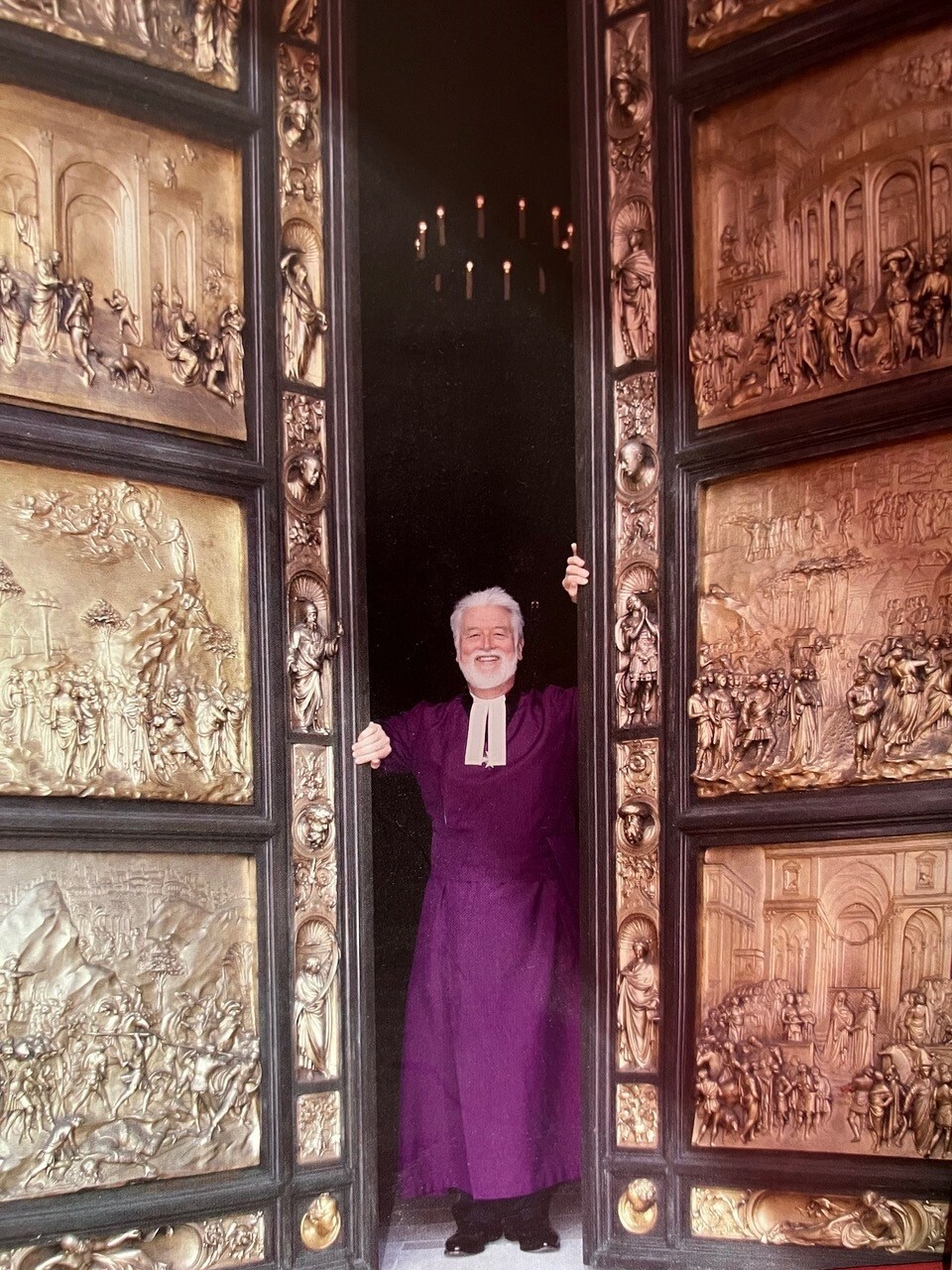
I was first introduced to Alan Jones when I interviewed with him for a job at San Francisco’s Grace Cathedral. He presented an imposing figure, tall, silver-haired and bearded, well-dressed, confident in his bearing. His was the office of a scholar, books and papers everywhere, well-used chairs next to tables of still more books and more papers. Once the door was closed behind me, the room took on the deep silence of a library.
We talked for a bit about things I’d done professionally, things the cathedral needed to accomplish, what the job might look like, and so forth; in short, Alan conducted a pretty much typical job interview, and I settled into what was familiar territory for me.
And then? Well, then, we took a wild and dizzying, destabilizing turn into the singular territory of Alan Jones.
He asked me about what I’d been reading lately – books, papers, magazines. He asked for my thoughts about climate change (I was working at a major multi-national energy company at the time.). Marriage equality. Race in America. The image of religion in modern society. The fate of high art and culture in a world built around instantaneous gratification.
That was just our first hour.
In our second, he asked some personal questions: Did I know the city? Was I married and did I have kids? What faith did I practice?
I said I was a native San Franciscan, was married and had two kids, and was raised in the Greek Orthodox church, and before I could say I didn’t at that moment have a spiritual community, he said, “Greek Orthodox, a tribal religion.” My face obviously reflected the fact that I didn’t quite know how to take his comment, because he quickly added, “My son-in-law told me he’s an atheist, but he’s a Greek Orthodox atheist.”
Funnily enough, I knew exactly what he meant – sort of what people mean when they say they’re secular Jews.
After our conversation ended, I left knowing a few things about him too. He’d been a choir boy at Queen Elizabeth’s coronation (he showed me the souvenir vinyl recording), he knew a lot of people I knew (or knew of) and, like me, he was a big fan of Foyle’s War (it reminded him, he said, of a time of greater prevailing civility).
Here’s what else I knew at a dead certainty: This guy was brilliant, well-read, well-spoken, curious, and even a little bit funny. He was surprising in a way people seem to be all the time on witty TV shows, but few people are in real life. He expressed the sincere desire for a church of radical openness to culture, thoughts and ideas, a vision I’d never heard before (or since). He was a complete grown-up, who recognized limitations, weaknesses, inconsistencies, shortages of time and money.
To make a long story short, I took the job and we worked closely together for several years. Over that time, I came to appreciate in even greater measure what a unique person he was. He lived the idea that people could hold both religious and intellectual beliefs fervently and simultaneously. He hosted The Forum (click for a video of an episode), a weekly live talk show to explore the connection between faith and life in a diverse, secular, technological society, with guests like Jane Goodall, Robert Reich, Michael Pollan, Marion Nestle, Sandra Day O’Connor, Garry Wills, Mollie Katzen, Stephen Prothero, Carey Perloff, Reverend Professor Peter J. Gomes.
He opened the doors of the imposing cathedral to all; under his expansive vision we hosted social and artistic events you wouldn’t think would be hosted by a church – a sculpture garden, concerts with Carlos Santana, Bonnie Raitt, Bill Frissell, the Blind Boys of Alabama, the North American tour of the Keiskamma Altarpiece, silent films, original plays and many more.
Why did this make sense to him? Historically, cathedrals had been the community center of civic, as well as religious life. Alan wanted Grace Cathedral to live up to that model, and he did his best to ensure it did.
The last time I saw Alan was last year, at the memorial service of a mutual friend and former colleague. He told me his health had been worsening and that he was mightily pissed off about it. Still, we warmly reminisced a bit about our ‘good old days’ working together and shared a couple of laughs. He still towered over the other mourners and was the room’s center of attention, but he was quieter, he looked tired, perhaps even a bit smaller. When I think of him, I don’t want to picture him in that way at all.
I hope to always remember him, as that tall, elegant, silver-haired gentleman, swooshing around the cathedral in his outrageously decorated robes, spinning stories (he called them sermons but as a speechwriter I knew damn well what he was up to), challenging one and all to enter a sacred space and think bigger, think differently, think of faith in God as fully compatible with science and civic good in a diverse and secular society.
When you think of the majority of today’s empty, irrational, over-produced, self-enriching, politically motivated religious leaders, you can’t help but appreciate that Alan Jones was a rare bird, indeed.
May his memory be eternal.
This link will take you to an excerpt of a video tribute to Alan made for his final gala as dean.




This is beautiful, Brent. Thanks for sharing.
Best,
<
div>Karen
<
div dir=”ltr”>
<
blockquote type=”cite”>
Thank you so much, Karen.